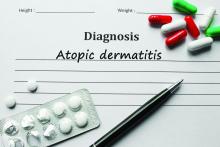Systemic corticosteroids (SCSs) should be limited to short courses as a transition to steroid-sparing therapies in patients with atopic dermatitis because of the potential for adverse effects, reported Sherry Yu, MD, of Massachusetts General Hospital, Boston, and her associates.
Rebound flares are one of many adverse effects (AEs) that can occur when using SCSs, according to a systematic review of 52 reviews and 12 studies. Several of the studies from the systematic review found that rebound flares occurred after discontinuation of oral prednisone. One such study found that 15 of 38 patients (40%) with severe atopic dermatitis (AD) had to discontinue use of oral prednisone because of disease flares. Another study comparing oral vs. intramuscular methylprednisolone found that patients experienced rebound flares 1 week after discontinuing use of SCSs; in this particular study, there was no long lasting improvement in patients’ AD, Dr. Yu and her associates reported in their review published in the Journal of the American Academy of Dermatology.Another AE is adrenal insufficiency, defined as a cortisol level less than or equal to 500 nmol/L. In a meta-analysis of 74 articles with 3,753 participants, there was a significant increase in absolute risk of adrenal insufficiency with medium term use (1 month to less than 1 year) and long term use (more than 1 year) of SCSs, as well as medium and high doses of SCSs. Adrenal insufficiency can occur in as little as 4 weeks and may be subclinical. This can leave patients vulnerable to infection and stress from surgery. Adrenal insufficiency also can manifest itself as weakness, fatigue, and shock in more severe cases.
Dr. Yu and her colleagues noted that tapering may minimize the risk of adrenal insufficiency and that a single morning dose or alternate dosing strategy may minimize this risk.
Another finding from this study was the adverse effects the SCSs have on pediatric patients. One study showed that 7 of 10 (70%) of children taking maintenance doses of beclomethasone dipropionate had growth impairment after 6 months of therapy. Significant growth disruption also was observed in children who had taken beclomethasone dipropionate only 4 weeks.
Dr. Yu and her colleagues warned that SCS should not be used to treat pediatric AD “because of growth retardation and other AEs.”
In conclusion, Dr. Yu and her colleagues said, “the literature supports short-term use of short courses of oral corticosteroids (less than 3 weeks) to interrupt acute flares, but rebound flaring is commonly observed after discontinuation. If SCSs are used at all, their use should be short term when bridging to other systemic therapies or phototherapy.” Despite the support for short-term courses of SCSs, the “duration of an optimal short course is not well defined” in the literature.
Dr. Yu reported no relevant financial disclosures. The other three authors reported relationships with various companies in the industry.
SOURCE: Yu S et al. J Am Acad Dermatol. 2017 Oct 13. doi: 10.1016/j.jaad.2017.09.074.


